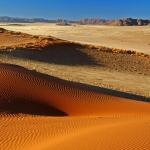Namibia Traditions
 Religion in Namibia: The Christians - 90% (mostly Protestants and Catholics), the rest - the adherents of traditional indigenous beliefs.
Religion in Namibia: The Christians - 90% (mostly Protestants and Catholics), the rest - the adherents of traditional indigenous beliefs.Namibia is considered the safest country in South Africa. The criminal situation in the country is calm on the streets of cities you can almost walk without fear at any time of day. Some signs of racial segregation in the country is quite noticeable - many schools are still divided into "white", "color" and "black" in some places clearly evident resentment of representatives of different races to each other, but rather, it is only a trace of past conflicts . For foreigners attitude is very good, but to the Russian - frankly positive (in these waters running many of our sailors, and not forgotten, and the contribution of the former Soviet Union in the establishment of the independence of Namibia).
The calculations in the local currency should be especially careful to let by denominations - the parallel circulation of the Namibian dollar and South African rand creates many problems - to move immediately on three different colors and pattern of the series of banknotes and metal coins, with the same face value coins vary in size appearance. It should not be changed once a lot of local dollars - to convert the cash back is virtually impossible, and, despite officially the same rate in South Africa for the Namibian dollar will total 0.7 rand (and therefore beneficial to acquire Namibian currency in South Africa). If the money is withdrawn from an ATM "BOB" (First National Bank), we should keep an ATM receipt - for her point of exit, albeit with a big commission, but it is theoretically possible to make a reverse exchange. For backward exchanges cash Namibian dollars can privately refer to the crews of commercial and fishing vessels based in Walvis Bay.
Prices for all goods and services frankly low. Sales tax (15,5%) applies to most products and are usually not included in the price. Persons of seventy years and above, including foreigners, in large discount stores is from 20 to 70% depending on the season.
Getting around the country freely, except for private homes, two diamond-producing areas, owned by De Beers (here generally forbidden to pick something from the ground), as well as some reserves. Visit diamond-bearing areas is possible only by special permit obtained through the Namibian Police (can also be obtained in advance, no less than a month before the trip, at the offices of local officially licensed tour operators). Skeleton Coast declared a national park, where allowed to enter only on a special pass (about $ 40 per person). Some areas adjacent to the territory of Angola, it is recommended to visit only as part of larger groups that are necessarily accompanied by an armed escort of local security forces.
Log in national parks of the country is limited. Log in charge (from 5 to 30N $, tickets must be maintained). Gates open at sunrise and closes at sunset, with the park visitors have to leave, and only officially registered groups have the right to remain in the park, but only within the camp. Tourists who failed to leave the park or return to the camp, subjected to heavy fines. Such requirements are very reasonable, given the predominantly nocturnal and the majority of local predators. It is recommended to reserve seats in the camps and lodges in the parks, especially in the period from June to August.
Locals very slow - to determine how soon will come the promised Namibians event, you should add three hours to the most pessimistic expectations. The sign "service 24 hours" does not mean "clock", and "now" does not mean "immediately". National holidays often depend on the calendar and see a high risk of private institutions at the most, at first glance, a weekday. The word "safe" also has meaning of "safe for local residents." Many Europeans in those conditions, which are so harmless for Namibians, simply will not survive.
The system of marking of streets and houses in the country is close to the United States, reaching roughly north-south streets are named "Street" and the numeral, from west to east - "Road" with its own name or the same numeric designation. Addresses are often written in the form of alphanumeric abbreviations. After the independence of many streets in the center city was renamed in honor of the national-liberation movement, which often creates confusion in the nomenclature - the locals use, and new and old names interchangeably.
Recommended never, under any circumstances, is not what you know, and do not go beyond the fenced areas of the camp. Even from the car without the permission of the conductor should not go. Pasteurized milk, dairy products, meat, poultry, seafood, fruits and vegetables are considered safe for consumption, but heat treatment is recommended for all food products.
Official holidays and weekends in Namibia
January 1 - New Year.
March 21 - Independence Day.
April - Easter and Good Friday.
May 1 - Workers' Day (Feast of Labor).
May 4 - Holiday Kassing.
May - Ascension.
May 25 - Africa Day.
August 26 - Day of heroes.
10 December - International Human Rights Day.
December 25-26 - Christmas (December 26 - Family Day).
Many private companies are closed for Christmas holidays from mid-December to mid-January, the official agency is currently working in standby mode.